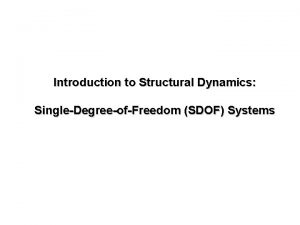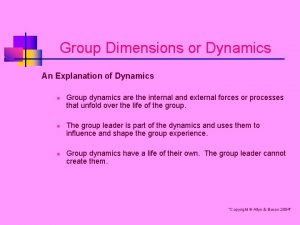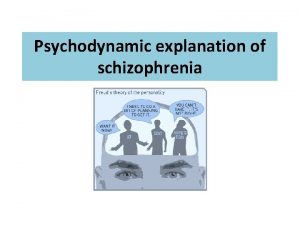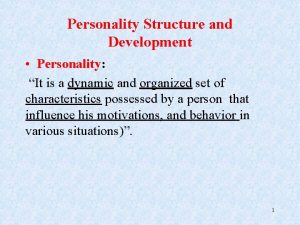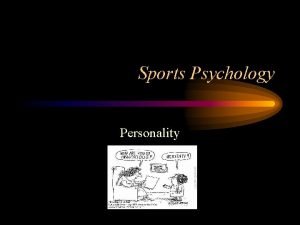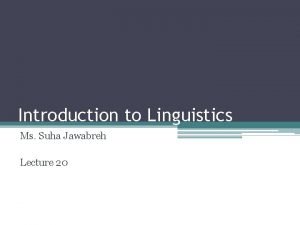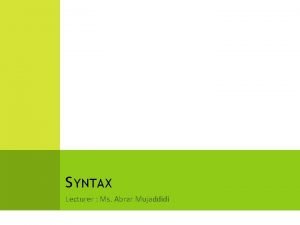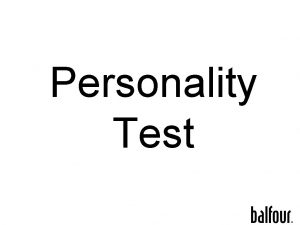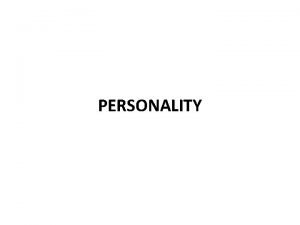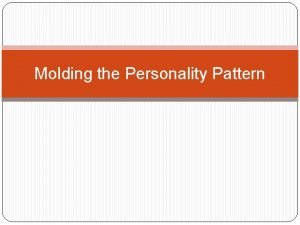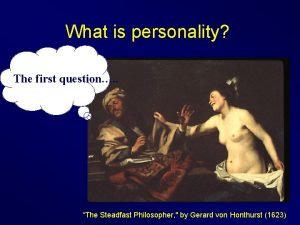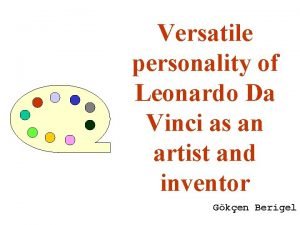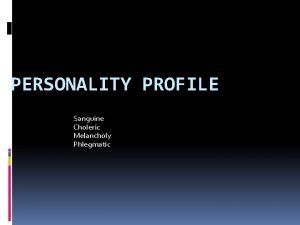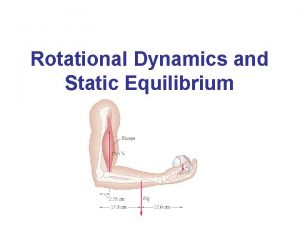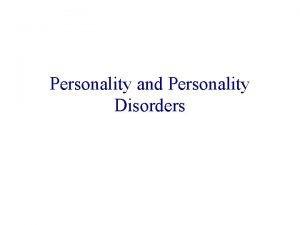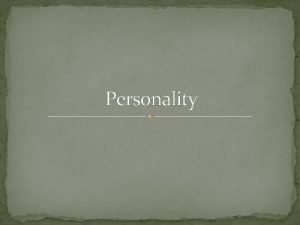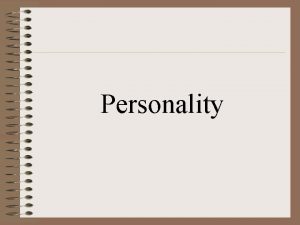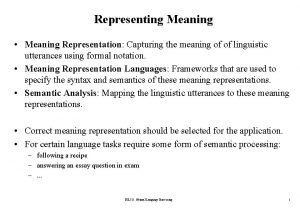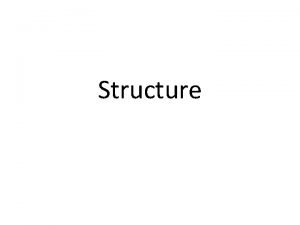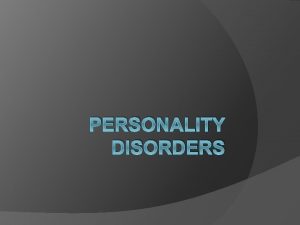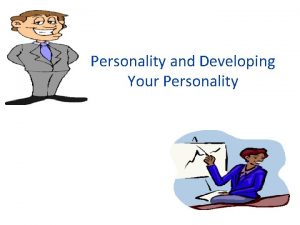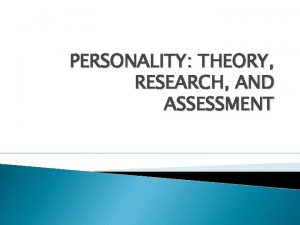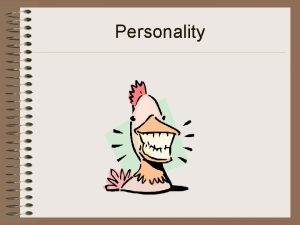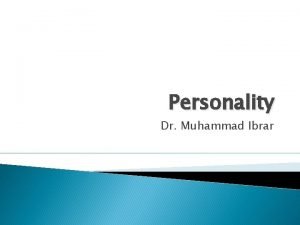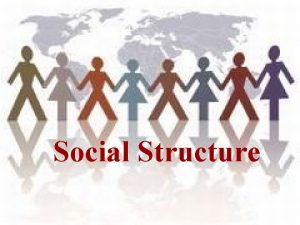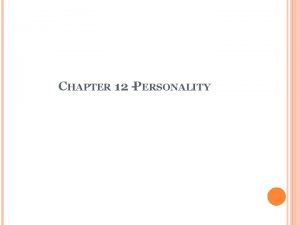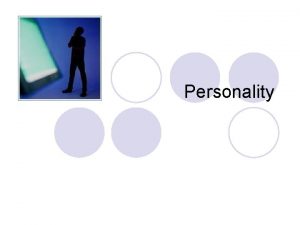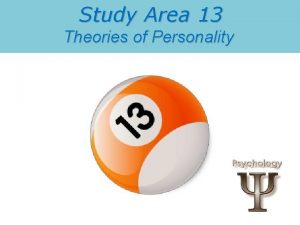WELCOME Personality structure and dynamics of personality MEANING



























- Slides: 27

WELCOME

Personality: structure and dynamics of personality

MEANING Ø The term ‘personality’ has been derived from Latin root ‘persona’ which referred to the facial mask worn by Roman actors on the stage. Ø Today, the term personality means many things to many people. Ø Personality refers to the “totality of what a person is”, which includes all traits (physical, psychological, as well as a variety of acquired habitual traits).

DEFINITIONS F. S Freeman, “An individual’s personality is the resulting individuality arising out of the interaction of a self -conscious and intelligent person and the environment in which he lives. ” G. W. Allport, “Personality is a dynamic organisation within the individual of those psycho-physical systems that determine his characteristic behaviour and thought. ”

Sigmund Frued

Structure of personality SIGMUND FRUED (1856 -1934) Ø Born - Vienna, Austria. Ø Father of psychology. Ø Founder of the Psychoanalytic approach.

STRUCTURE Ø Freud proposed that the personality consisted of three structures called • The Id, • The Ego and • The Superego. Ø Each of these structures is responsible for some aspect of our thinking and behavior.

ID Ø Id = represents our wants, desires, instant gratification, etc. We have no awareness of this part of our psyche, but it can be a driving force in our behavior. The Id is rooted in the desire for pleasure. Ø functions in the irrational and often times emotional part of the mind

Ø An Example: • At birth a baby is the mindset of getting what it wants for no other reason other than they want it. The Id is primitive in the way that it does what it wants in order to survive and better the life for themselves. The Id contains all the basic needs and feelings and has also been referred to as the libido. • Operates on pleasure principle of "I want it and I want it now. "

Ego • Ego - represents the rational part of our psyche. It is the closest of the three to our conscious awareness. Ego allows us to live in the world and balance the needs of our basic and instinctive wants and desires (id) and our moralistic and parental restrictions (superego). • ~Functions with the rational part of the mind. • ~The Ego develops out of growing awareness that you can’t always get what you want.

• ~The Ego relates to the real world and operates via the “reality principle”. It realizes the need for compromise and negotiates between the Id and the Superego. The Ego's job is to get the Id's pleasures but to keep in mind the consequences that could come from the action. • ~The Ego denies both instant gratification and the delayment of gratification. • ~If someone's ego is too strong then usually they are extremely rational and efficient, but cold and distant from other people.

superego Ø Superego = represent the moralistic and parental side of our psyche. The superego attempts to control our basic instincts but it too is outside of our conscious awareness. Ø The Superego is the last part of the mind to develop and could also be referred to as the moral part of the mind. Ø The Superego begins to put together everything our parents and society teaches us. It stores and enforces rules.

Ø The Superego is the last part of the mind to develop and could also be referred to as the moral part of the mind. Ø The Superego begins to put together everything our parents and society teaches us. It stores and enforces rules.


What is a Dynamic Personality? Ø A personality where an individual is confident, energetic and independent is called a dynamic personality. Ø Persons with this personality usually love new challenges, are responsible and are open to objective arguments in addition to having a sharp eye for errors. Ø However, in some cases, the dynamic personality be confused with arrogance.

The Dynamic Nature of Personality Ø The most important task confronting the field of personality is the task of capturing the dynamic, process-oriented nature of personality in a parsimonious fashion. Ø A motivational analysis allows us to express coherent cognition-affect-behavior patterns that distinguish individuals from each other.

Ø However, because it also illuminates the underpinnings of important psychological phenomena in all individuals (e. g. , helplessness, aggression),

CHARACTERISTICS OF PERSONALITY Personality is self-consciousness; Øit is through and through social; Øit is dynamic; Øit is the product heredity and environment; Øit is adjustable or modifiable; Øit is unique; Øit is integrated and function as a whole; Øit is assessable.

Biological Personality factors Sociological psychological Personality Factors

Physique Chemique Nervous system

PHYSIQUE

CHEMIQUE Ø The possible effect of the ductless glands personality development. Ø The parathyroid glands produces calcium salts. Ø The other glands like the pituitary, the sex gland, and adrenal gland affect the behaviour of the individual and then his personality.

NERVOUS SYSTEM Ø The efficiency of the sensory organs depends upon the well developed quality of the nervous system. Ø Our intellectual efficiency, physical power, patience, the quickness of adjustment, the readiness of acquiring new modes of responses, our reasoning and thinking all depend upon the nervous system. Ø Any injury to the system will affect the personality of the individual.

Social factors Home School Culture

Home • Parental attitude towards their children • Over-ambitious parents • Parental preference on the sex of the child • Step parents • Number of children in the family • Educational and socio-economic status of parents

Psychological factors Ø Intelligence. Ø Motivation. Ø Attitude. Ø Emotion. Ø Interest and sentiment These are the important psychological factors that affect the personality development.

Thank You
 Dynamic personality definition
Dynamic personality definition Welcome welcome this is our christmas story
Welcome welcome this is our christmas story Structural dynamics
Structural dynamics Meaning of group dynamics
Meaning of group dynamics Dynamics of malaysian music
Dynamics of malaysian music The structure of personality
The structure of personality Tripartite structure of personality
Tripartite structure of personality Undoing defense mechanism examples
Undoing defense mechanism examples Hollanders model of personality
Hollanders model of personality Structural ambiguity examples
Structural ambiguity examples Deep structure in linguistics
Deep structure in linguistics S s' 's grammar
S s' 's grammar Static data structure and dynamic data structure
Static data structure and dynamic data structure Deep structure
Deep structure Pig drawing test
Pig drawing test Rogers concept of self
Rogers concept of self Mc craes
Mc craes Molding personality meaning
Molding personality meaning Personality assessment
Personality assessment Tolerance character trait
Tolerance character trait Brand personality meaning
Brand personality meaning Steadfast personality meaning
Steadfast personality meaning Leonardo da vinci personality
Leonardo da vinci personality Personality plus meaning
Personality plus meaning Jelaskan pengertian etika dan kepribadian
Jelaskan pengertian etika dan kepribadian Melancholic sanguine meaning
Melancholic sanguine meaning Static equilibrium rotational motion
Static equilibrium rotational motion Serongagandi instrument
Serongagandi instrument


